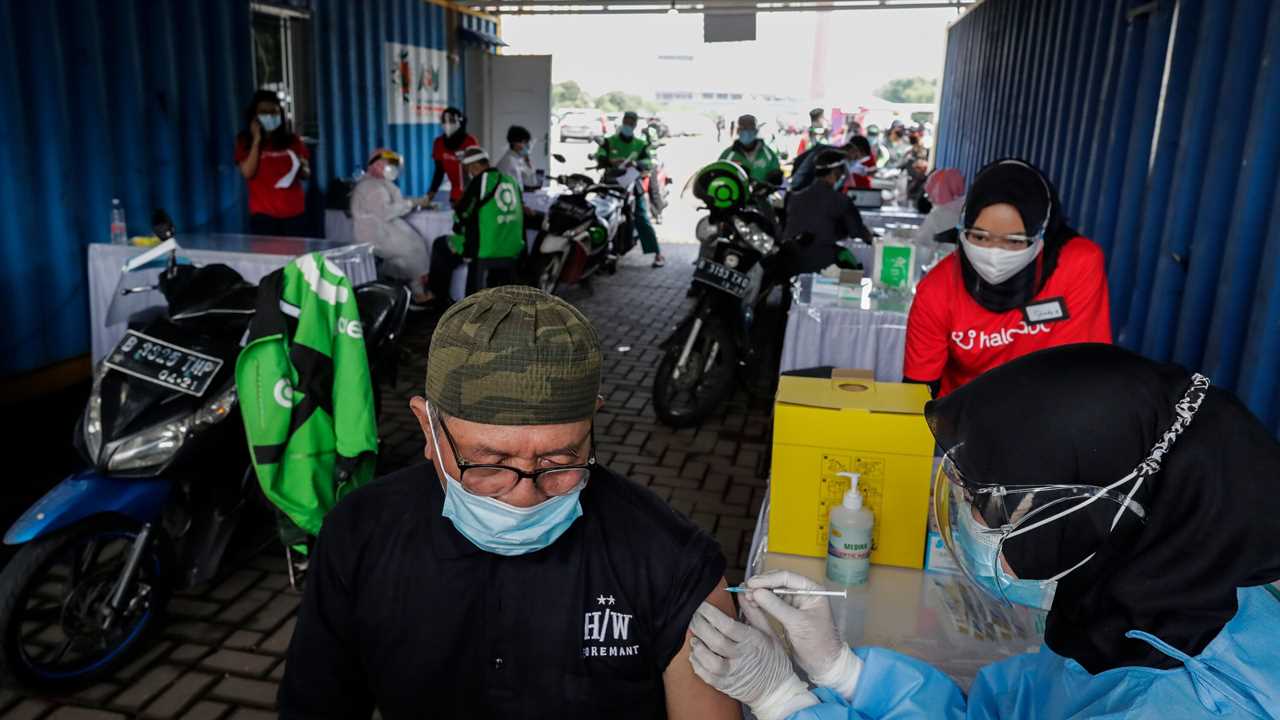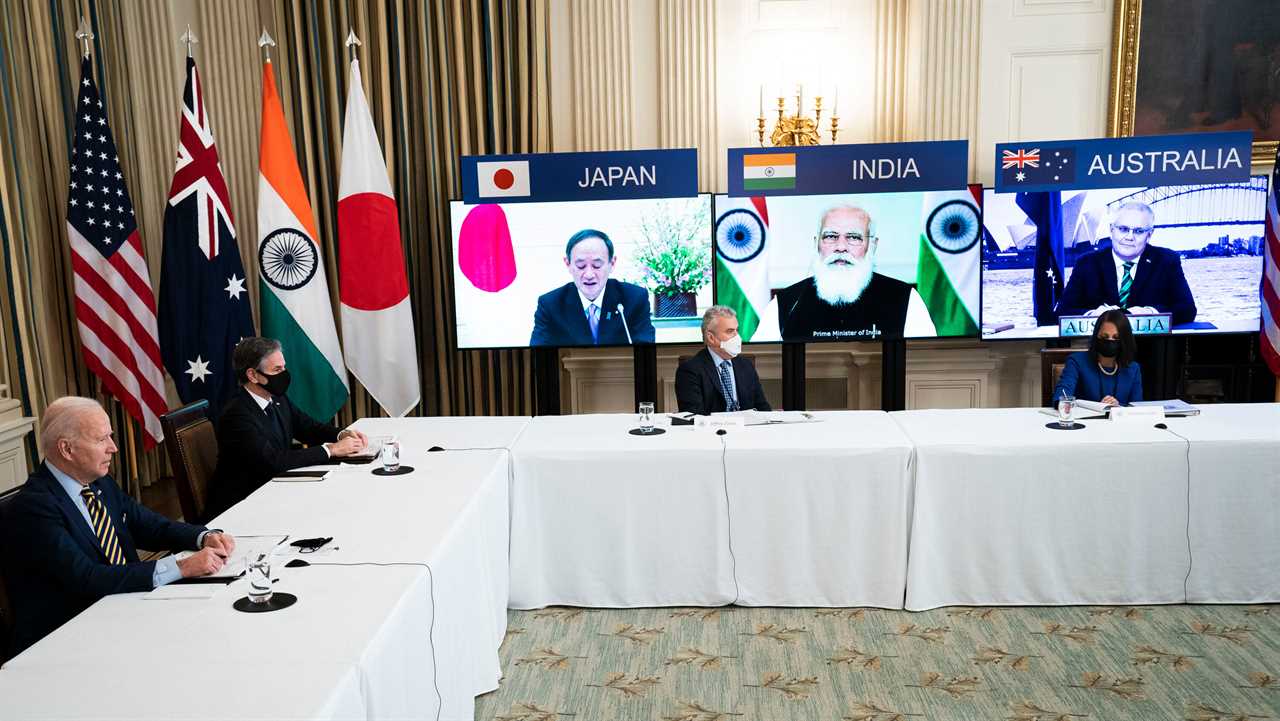
WASHINGTON — President Biden, under intense pressure to donate excess coronavirus vaccines to needy nations, moved on Friday to address the global shortage in another way, partnering with Japan, India and Australia to expand global vaccine manufacturing capacity.
In a deal announced at the so-called Quad Summit, a virtual meeting of leaders of the four countries, the Biden administration committed to providing financial support to help Biological E, a major vaccine manufacturer in India, produce at least 1 billion doses of coronavirus vaccines by the end of 2022.
That would address an acute vaccine shortage in Southeast Asia and beyond without risking domestic political blowback from exporting doses in the coming months, as Americans clamor for their shots.
The United States has fallen far behind China, India and Russia in the race to marshal coronavirus vaccines as an instrument of diplomacy. At the same time, Mr. Biden is facing accusations of vaccine hoarding from global health advocates who want his administration to channel supplies to needy nations that are desperate for access.
Insisting that Americans come first, the president has so far refused to make any concrete commitments to give away American-made vaccines, even as tens of millions of doses of the vaccine made by the British-Swedish company AstraZeneca sit idly in American manufacturing facilities.
“If we have a surplus, we’re going to share it with the rest of the world,” Mr. Biden said this week, adding, “We’re going to start off making sure Americans are taken care of first, but we’re then going to try and help the rest of the world.”
In fact, the president has a lot of work ahead of him domestically to make good on the promises he has made in recent days: that all states must make all adults eligible for vaccinations by May 1, that enough vaccine doses will exist by the end of May to inoculate every American adult, and that by July 4, if Americans continue to follow public health guidance, life should be returning to a semblance of normalcy.
Vaccine supply appears on track to fulfill those goals, but the president must still create the infrastructure to administer the doses and overcome reluctance in large sectors of the population to take them.
Still, Mr. Biden has also made restoring U.S. leadership a centerpiece of his foreign policy agenda after his predecessor frayed alliances and strained relationships with allies and global partners. His secretary of state, Antony J. Blinken, said in a recent BBC interview that a global vaccination campaign would be part of that effort; Washington, he said, was “determined” to be an “international leader” on vaccinations.
Foreign policy experts and global health activists see clear diplomatic, public health and humanitarian reasons for doing so.
“It’s time for U.S. leaders to ask themselves: When this pandemic is over, do we want the world to remember America’s leadership helping distribute lifesaving vaccines, or will we leave that to others?” said Tom Hart, the North America executive director of the One Campaign, a nonprofit founded by the U2 singer Bono and dedicated to eradicating world poverty.
The federal government has purchased 453 million excess vaccine doses, the group says. It has called on the Biden administration to share 5 percent of its doses abroad when 20 percent of Americans have been vaccinated, and to gradually increase the percentage of shared doses as more Americans receive their vaccines.
U.S. Will Partner to Expand Global Vaccine Supply
On Friday, the Quad, which includes the United States, Australia, India, and Japan, held a virtual conference where the four countries agreed to join together to expand global vaccine supply.
And we’ve launched an ambitious new joint partnership that is going to boost vaccine manufacturing and — for the global benefit — and strengthen vaccinations to benefit the entire Indo-Pacific. We’re establishing a new mechanism to enhance our cooperation, and raise our mutual ambitions as we address accelerating climate change. We’ve got a big agenda ahead of us, gentlemen, as you well know. But I’m optimistic about our prospects. The Quad is going to be a vital arena for cooperation in the Indo-Pacific. And I look forward to working closely with all of you in the coming years.

As of Friday, 13.5 percent of people in the United States who are 18 or older have been fully vaccinated, according to the Centers for Disease Control and Prevention.
The authoritarian governments of China and Russia, which are less buffeted by domestic public opinion, are already using vaccines to expand their spheres of influence. While the Biden administration plans its strategy to counter China’s growing global clout, Beijing is burnishing its image by shipping vaccines to dozens of countries on several continents, including in Africa, Latin America and particularly in its Southeast Asian backyard.
Russia has supplied vaccines to Eastern European nations, including Hungary, the Czech Republic and Slovakia, at a time when Biden officials want to keep the European Union unified against Russian influence on the continent.
“We may be outcompeted by others who are more willing to share, even if they’re doing it for cynical reasons,” said Ivo H. Daalder, a former NATO ambassador and the president of the Chicago Council on Global Affairs. “I think countries are going to remember who was there for us when we needed them.”
Latest Updates
- A vigil for a woman killed in Britain is canceled over Covid restrictions.
- China asks visa applicants to get inoculated with Chinese-made vaccines.
- How to keep young children safe together? The C.D.C. weighs in.
With worrisome and highly infectious new variants emerging in the United States and around the world, public health experts say vaccinating people overseas is also necessary to protect Americans.
“It has to be sold to Americans as an essential strategy to make Americans safe and secure over the long term, and it has to be sold to a highly divided, toxic America,” said J. Stephen Morrison, a global health expert at the Centers for Strategic and International Studies. “I don’t think that’s impossible. I think Americans are beginning to understand that in a world of variants, everything that happens outside our borders ups the urgency to move really fast.”
Mr. Blinken said as much to the BBC: “Until everyone in the world is vaccinated, then no one is really fully safe.”
The Quad Vaccine Partnership announced at the summit meeting on Friday involves different commitments from each of the nations, according to the White House.
Beyond assistance for the Indian vaccine manufacturer, the United States pledged at least $100 million to bolster vaccination capacity abroad and aid public health efforts. Japan, it said, is “in discussions” to provide loans for the Indian government to expand manufacturing of vaccines for export and will aid vaccination programs for developing countries. Australia will contribute $77 million to provide vaccines and delivery support with a focus on Southeast Asia.
The four countries will also form a Quad Vaccine Experts Group of top scientists and government officials who will work to address manufacturing hurdles and financing plans.
Mr. Morrison said the administration deserved “some credit” for the effort, adding, “It shows diplomatic ingenuity and speed.” But a spokesman for the One Campaign, which focuses on extreme poverty, said his group would still like to see a plan for the United States’ vaccine stockpile and noted that Africa had administered far fewer doses per capita than Asia.
Mr. Biden’s efforts to ramp up vaccine production have helped put the United States on track to produce as many as a billion doses by the end of the year — far more than necessary to vaccinate the roughly 260 million adults in the United States.






